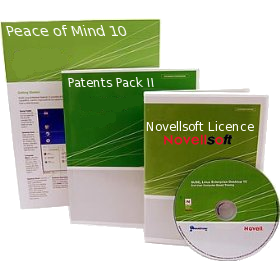08.31.11
Links 31/8/2011: RHEL 7, LibreOffice 3.4.3
![]()
Contents
GNU/Linux
-
£15 ARM Linux computer before Christmas
The RaspberryPi Foundation, which aims to put computers in front of children for £15, has taken delivery of 50 engineering prototypes, and intends to get the final version to customers by the end of the year.
Based in Cambridge and founded by six high-tech high-flyers, the foundation’s aim is to cure the programmer shortage by inspiring people to take up computing in childhood – as Sinclair Spectrums and BBC Micros once did.
-
VIDEO: Quake 3 Running on Tiny, Little Raspberry Pi
-
Fixing old computers with Linux
Now this snowbank computer that I am using to write this has 512 megs of RAM, 128 meg video card, and a 300 Gig SATA hard disk, and two DVD drives. It is a Dell Dimension XPS just barely 5 years old when I found it (I would never have spent this much money on a computer when it was purchased new). Recent rejects that I have had all have SATA drives and at least one gig of memory. Again these computers were running too slow so the owner bought a new one. These poor souls just can’t convert to Linux and so they keep on paying. I get their rejects. My mom is running Linux on one of them.
-
Desktop
-
Chromebooks Live!
I’ll be the first to admit that while I like Chromebooks, I own a Samsung Series 5, Chromebooks also have serious problems. Still, the Chromebook is far from being dead.
My fellow ZDNet writer, Scott Raymond argues that the consolidation of WebKit, and Chromium open-source Web browsers source code trees means the end of a need for Chromebooks–and by extensions other lightweight laptops. Specifically, Raymond argues, “If we had the Chrome browser on an Android tablet, why would we want a Chromebook? For the price of a Chromebook you could pick up an Android tablet with a keyboard that connects via dock or Bluetooth. You would have the same functionality, plus the added capabilities of Android.”
-
-
Kernel Space
-
Linux at 20 years: a progression from promising to pervasive
Speak to a mobile analyst and it’s not uncommon to hear comments such as “the future is Android” banded about.
Speak to an open source convert about cloud computing and you might hear “Linux modularity is a killer for cloud” spoken.
Google that last comment now and you’ll get this blog, Google it in eighteen months and you just might get a few more hits.
-
Linux Benchmarks, Reviews Coming For September
-
The People Shaping the Future of Linux
-
-
Applications
-
TrueCrypt Locks Down Data In a Rock-Solid Vault
For data sensitive enough to warrant encryption, a tool like TrueCrypt is a great solution. The app creates and encrypted file container of any size on your hard drive or on an external drive. Once mounted using a super-strong password of your own choosing, files can come and go as you please. Once dismounted, they’re locked behind a virtually impenetrable wall of encryption.
-
Instructionals/Technical
-
DocVert Can Handle All Your Document Conversion Needs
-
Running WordPress On Nginx (LEMP) on Debian Squeeze/Ubuntu 11.04
-
How to Use Screen in Linux
-
Implementation Qemu-kvm 0.15.0,SpiceServer and Spice-Gtk-0.7 on Ubuntu 11.10 KVM Server the most recent approach
-
Generating Web Charts with Gnuplot and Web Scripting
-
10 steps to getting a Haiku VM running
-
Installing PowerDNS (With MySQL Backend) And Poweradmin On Debian Squeeze
-
How To Install VMware Player On Ubuntu 11.04/Linux Mint 11
-
Add a Nginx Reverse Proxy to Your LAMP Setup
-
Implementation Qemu-kvm 0.15.0,SpiceServer and Spice-Gtk-0.7 on Ubuntu 11.10 KVM Server the most recent approach
-
How to Setup and Use Github in Ubuntu
-
-
Games
-
Innovative Real Time Strategy Game ‘Achron’ Released for Linux
Much awaited innovative real time strategy game Achron has been released for Linux. Achron features single-player and multiplayer strategic gameplay with free-form time travel.
-
-
-
Desktop Environments
-
K Desktop Environment/KDE SC)
-
A Performance Overhaul Of KDE’s KWin
Martin Gräßlin has successfully boosted the performance of KDE’s KWin for the upcoming 4.7.2 point release and more so for the KDE SC 4.8 release. This is an attempt to make the KWin compositing window manager handle rendering at sixty frames per second, which it hasn’t been able to scale to that frame-rate due to deficiencies in the project’s code-paths.
-
KDE Frameworks 5.0: What it means for KDE
There have been some rather interesting announcements from the KDE community that give an idea of where the desktop environment is headed. In very short, KDE Frameworks 5.0 will begin development soon!
-
-
-
Distributions
-
Red Hat Family
-
Default to open: The story of open source and Red Hat
-
Red Hat Seeks Wish List Items from Customers for RHEL 7
There are strong signs that Red Hat is approaching the next wave of its considerably successful business story. As CEO Jim Whitehurst has noted, virtualization is emerging as a big concern for the company going forward, as it increasingly squares off with VMware in that space. And recently, although his position is arguable, he contended that both the PC and fat client operating systems are headed for obsolescence. But let’s not forget that Red Hat is an operating system-centric company, and it can take lessons from other technology companies that have specialized in operating systems, including Microsoft and Apple. Those companies have always kept close ties with customers when it comes to additions to operating system updates, and Red Hat is taking that job seriously, too.
-
Red Hat sets up RHEL 7 discussion forum
-
Red Hat Expands Customer Involvement in Red Hat Enterprise Linux 7 Development
-
-
Debian Family
-
Derivatives
-
Canonical/Ubuntu
-
How do I benefit from Ubuntu Pre-Install?
I was reading the Ubuntu Forum when I saw a thread called Ubuntu-certified hardware is not accurate ! This grabbed my attention.
The main issue seemed to be that the user that started the thread wanted to know if he should buy the Lenovo X220 or not. He had looked around and seen that the system is Certified (pre-install only) for 10.10 but found several user comments in the web pointing at problems with stock Ubuntu.
-
Bisigi Themes Add Ubuntu 11.04 Support
-
Unity? Thanks, but no
Tried Unity, Unity 2D and GNOME3 today. Removed each after less than 0.5h of playing with them.
-
Column: Ubuntu for Developers’ workstations
In June this year, Eclipse, a popular IDE, published the results of a global survey of its community, which aims to show how people are using Eclipse and other open source software (OSS), and participating in open source communities. The purpose was to create a profile of how open source developers interact with the community. Incidentally, the Eclipse developer survey had the fourth highest number of respondents from India.
-
-
-
-
-
Devices/Embedded
-
Phones
-
Android
-
Android Honeycomb- Facts You Probably Didn’t Know
Yes there will be a few tweaks here and there; however there won’t be huge changes. It’s pretty cool too- seems that the OS is so complete that there aren’t any major upgrades that we have to wait for.
-
Android-x86 2.3 RC1 (Test build 20110828) is released.
-
-
-
Sub-notebooks/Tablets
-
HP’s webOS may yet live (but probably not with HP)
DigiTimes reported on Monday that Samsung Electronics, which has denied any interest in buying HP’s PC division, is “considering purchasing webOS to compete head on against Apple and Google, according to sources from notebook players.”
-
The secret weapon of the HP Touchpad: Linux
-
TouchPad longevity gets a boost from Android/Ubuntu ports
-
-
Free Software/Open Source
-
Web Browsers
-
Oracle/Java/LibreOffice
-
The Document Foundation announces LibreOffice 3.4.3
The Internet, August 31, 2011 – The Document Foundation (TDF) maintains the speedy pace of LibreOffice development with the announcement of version 3.4.3, intended for enterprise deployments. The new release arrives two weeks after version 3.3.4 (intended for more-conservative users) and one month after the previous release of the 3.4 family, which provides a larger feature set based on cleaner and leaner code.
-
LibreOffice 3.4.3 Is Now Available for Download
-
-
CMS
-
Jekyll and other static site generators are, currently, harmful to the free, open source software movement
My blog is powered by WordPress. WordPress remains at its core a monstrous amalgamation of PHP spaghetti code. Thus, despite the fact that WordPress is free (beer+speech), easy to use, well supported, well documented, and all that jazz… it still pains my hacker sensibilities to use it. For similar reasons, a lot of hacker types are moving away from WordPress and similar blog software to static site generators like jekyll.
-
-
Healthcare
-
VA Open Source Health Software Site is Open for Business
The Veterans Affairs Department open source electronic health record software website went live today with a pitch that it will serve as the nexus for an “open source community designed to unleash innovation in electronic health record software.”
-
VA open source agent set to go live
The Veterans Affairs Department is set to make its open source agent operational tomorrow and make available the software code of various applications in the electronic health records of VA and the Defense Department.
Users of the applications will also have a method to report back to the open source agent changes to the software.
-
-
Semi-Open Source
-
Open source: Driving change in the software industry
The subsequent development of automotive technology was rapid, due in part to the hundreds of small manufacturers competing to gain the world’s attention. What we saw was the start of an international, industrial revolution as well as a struggle between automobile manufacturers for commercial dominance that is still fought today. As a result of greater competition for customers, and customers’ greater demand for innovation, car buyers now have an infinite number of brands, makes, models and pricing options to choose from to meet their individual needs.
-
-
Funding
-
MapR makes friends of Hadoop and the enterprise, raises $20M
Hadoop is open source software that allows companies to store data on clusters of cheaper servers and run software very quickly on top of those clusters. It organizes and prioritizes data, so often-used data is pushed to the top of the stack for easy access. Along with the organization, Hadoop uses a graphical user interface and heat maps to help data managers monitor usage and locate problems. The software also offers analytics for companies that want to watch their data to spot emerging trends.
-
-
Project Releases
-
Programming
Leftovers
-
It’s Most Certainly Not The End of the OS
-
Asus Tech – You will NOT fool me Twice
-
This USB 3.0 Flash Drive Has 2 TB of Storage
-
Google and OpenDNS join forces to speed up DNS
-
Security
-
Slow HTTP DoS vulnerability test tool
-
Updated Chrome and Firefox for fraudulent Google certificate available
-
Thunderbird 6.0.1 and 3.1.13 security updates now available
-
Firefox 6.0.1 and 3.6.21 desktop security updates now available
-
Apache patches Web server DoS vulnerability
-
SSL Certificates: What’s Left to Trust?
-
-
Defence/Police/Aggression
-
WikiLeaks reveals Atrocities by US forces
US forces had committed a heinous war crime during a house raid in Iraq in 2006, wherein one man, four women, four children, and one infant were summarily executed, a State Department diplomatic cable released last week by WikiLeaks revealed.
The cable excerpts a letter written by Philip Alston, Special Rapporteur on Extrajudicial, Summary, or Arbitrary Executions, addressed to then Secretary of State Condoleeza Rice.
American troops had approached the home of Faiz Harrat Al-Majma’ee, a farmer living in central Iraq, to conduct a house raid in search of insurgents in March 2006.
“It would appear that when the MNF (Multinational Forces) approached the house,” Alston wrote, “shots were fired from it and a confrontation ensued.” Afterwards, “troops entered the house, handcuffed all residents and executed all of them.” Mr. Faiz Hratt Khalaf, (aged 28), his wife Sumay’ya Abdul Razzaq Khuther (aged 24), their three children Hawra’a (aged 5) Aisha ( aged 3) and Husam (5 months old), Faiz’s mother Ms. Turkiya Majeed Ali (aged 74), Faiz’s sister (name unknown), Faiz’s nieces Asma’a Yousif Ma’arouf (aged 5 years), and Usama Yousif Ma’arouf (aged 3 years), and a visiting relative Ms. Iqtisad Hameed Mehdi (age 23) were killed during the raid.
Alston’s letter reveals that a US airstrike was launched on the house presumably to destroy the evidence, but that “autopsies carried out at the Tikrit Hospital’s morgue revealed that all corpses were shot in the head and handcuffed.”
-
-
Cablegate
-
WikiLeaks cable: US expected Congress bribes in TransCo deal
The US embassy expected money to change hands in Philippine Congress before it granted a franchise to a consortium in 2007 to operate the Philippine National Transmission Company (TransCo), a cable published by whistleblower group WikiLeaks said.
-
-
Finance
-
Big Reason to Shut SEC, Start Over: William D. Cohan
Thanks to Darcy Flynn, a longtime attorney at the Securities and Exchange Commission, we now have all the ammunition we need to do what should have been done years ago: terminate the SEC, with extreme prejudice, and in its place construct a new regulatory watchdog for Wall Street free of obvious conflicts of interest.
Flynn’s courage has almost been lost in all the recent apocalyptic talk of earthquakes and hurricanes, but a few weeks back he did something remarkable. After raising concerns internally at the SEC last year — and getting nowhere — Flynn went public and alleged in a formal whistleblower complaint that for at least 17 years the SEC “followed a policy of systematically destroying documents” related to what are known as Matters Under Investigation, or MUIs, most of which were focused on possibly illicit or illegal behavior at Wall Street firms. MUIs are the first step in investigating a case that may lead to a formal SEC inquiry.
-
Matt Taibbi on the SEC and Wall Street
For the past two decades, according to a whistle-blower at the SEC who recently came forward to Congress, the agency has been systematically destroying records of its preliminary investigations once they are closed.
-
Citigroup, Goldman Big ‘Super Committee’ Donors
Goldman Sachs(GS), Citigroup(C), JPMorgan Chase(JPM), Bank of America(BAC) and General Electric(GE) all rank in the top 10 organizations in terms of their campaign contributions to a special Congressional committee charged with finding ways to reduce the deficit, according to MapLight.org a nonpartisan organization that studies the relationship between money and politics.
-
Panel tallies massive waste and fraud in wartime U.S. contracts
-





















 Content is available under CC-BY-SA
Content is available under CC-BY-SA